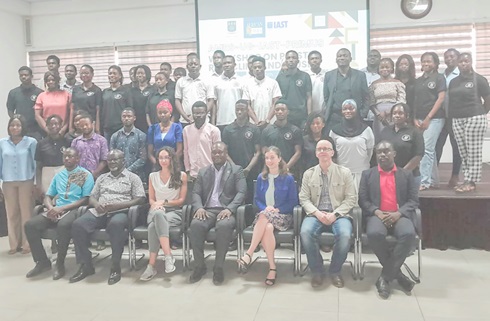
Pass law on segregation of waste materials - Waste officer advocates
A waste Segregation Officer at the Jekora Ventures Limited, Bubu Kumordzie, has advocated a policy that requires the citizenry to separate out waste materials at source to ensure using less time and resources in recycling such materials.
He said instead of lumping waste materials – plastics, papers, food and other items together - it would do the nation a lot of good if there was a law mandating citizens to segregate their waste materials for the sake of recycling and finding sustainable solutions to plastic waste challenges.
Event
Mr Kumordzie made the remark at a two-day workshop on “Plastic Waste Recycling and Reuse” organised by the Institute of Applied Science and Technology (IAST) of the University of Ghana (UG) in collaboration with the African Materials Research Society (AMRS) and the Policy and Research for the Integrated Management of Urban Sustainability (PRIMUS) in Accra.
“As a company and trailblazers of source separation of waste, we encourage our customers to separate their waste at source so we use colour coded bins to aid them to do this where blue bins stand for plastic materials, brown for papers, green for food waste and black for what we call non-recyclables,” he said.
Workshop
The workshop which was under the auspices of the PRIMUS project sought to research into new polymer recycling technologies that allowed the production of new technically and safety compliant recycled materials that could be used for manufacturing high value products to make collecting and recycling plastics become economically feasible, as well as good for the environment.
The two-day event, on the theme: “Strengthening Research and Innovation Capacities in Sustainable Plastic Waste Recycling,” covered discussions on sampling and analyses; upgrading of recycled plastics for value-added products; industrial mechanical recycling of plastics; regulation and legal aspects of recycled plastics.
In attendance were the Head, Department of Materials Science and Engineering, Prof. Emmanuel Nyankson, Mathilde Marie Stéphanie Taveau, from the Plastics Recyclers Europe, Belgium, Ana Rita Carvalho Neiva of Coolrec Plastics BV, Netherlands and Dr Benjamin D. Ofori of the Institute of Environmental and Sanitation Studies, UG.
Partnership
The Director of the IAST, Prof. David Dodoo-Arhin, said the government, through the Ministry of Environment, Science, Technology and Innovation (MESTI) had formed the Ghana National Plastic Action Partnership to support public and private sector transition to a plastic circular economy thereby, ensuring sustainable plastics management.
“In partnership with UN bodies such as UNIDO and UNDP, efforts are being made to strengthen the national capacity of Ghana to transition to a circular economy framework that addresses plastic leakages into the country’s oceans and watercourses through operationalising the national plastic action partnership and national plastic management policy,” he said.
PRIMUS Project
The Professor of Materials, Chemistry and Technology at the University of Eastern Finland, Prof. Jarkko Juhani Saarinen, explained that the PRIMUS project was a three-year research and innovation plan funded by the European Union under the Horizon Europe Programme.
“The target for the PRIMUS is we are concentrating on mechanical recycling and improving the quality of the recyclers that we are generating so that we can guarantee both the quality and safety of these materials. We are developing circulation of non-recycling underutilised plastics to improve the sustainability of the whole plastic sector. We are also developing tools to guarantee traceability,” he said.
“Our mission here in Ghana is to strengthen the collaboration between our university and the University of Ghana and also learn from each side the best ways to treat plastics.”
